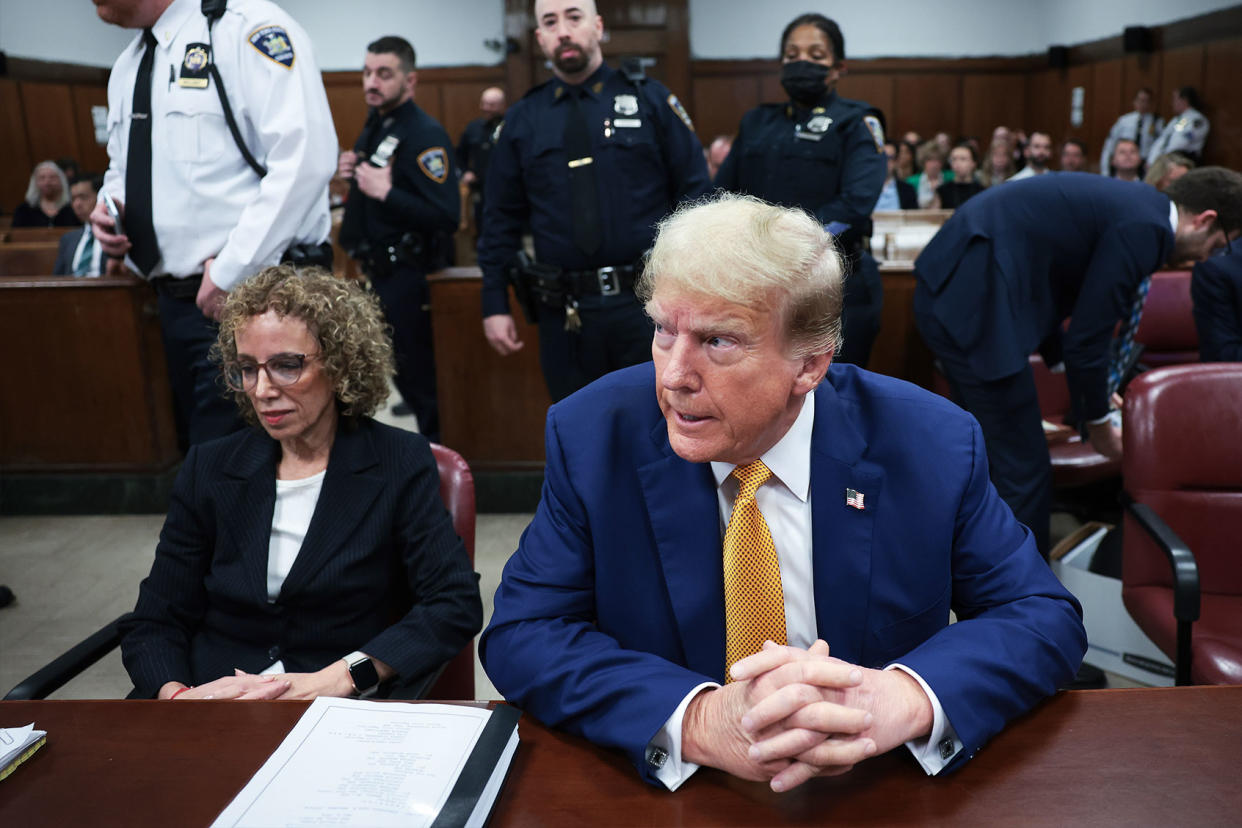"Close to being smoking guns": Legal experts say new Trump trial documents are the "star witnesses"

- Oops!Something went wrong.Please try again later.
- Oops!Something went wrong.Please try again later.
- Oops!Something went wrong.Please try again later.
- Oops!Something went wrong.Please try again later.
- Oops!Something went wrong.Please try again later.
On the opening day of Donald Trump’s criminal trial in Manhattan, the former president’s lead defense counsel asked jurors to use their common sense – to actually reflect on the prosecution’s argument that an infamous cheapskate would not only pay off an adult film star, spending $130,000 to buy her silence about a one-night stand that he says never happened, but dole out an additional $300,000 or so to compensate Michael Cohen, is former fixer, for making a wire transfer?
“Think for a moment,” Todd Blanche instructed the 12 people who will decide if Trump, charged with 34 counts of falsifying business records, engaged in a conspiracy to hide the hush payment and break campaign finance laws. “Would a frugal businessman,” Blanche asked, “would a man who pinches pennies, repay a $130,000 debt to the tune of $420,000?”
On Monday, day 12 of the trial, prosecutors introduced a document that appears to succinctly answer that question: yes.
The testimony from current and former accountants at the Trump Organization may not have had the drama of Hope Hicks breaking down in tears while testifying about her former boss’ knowledge of hush payments. But while the discussion may have been dry and at times arcane, delving into the world of invoice processing and the accounts payable department, the documents they discussed may be the most damning pieces of evidence that prosecutors have introduced so far.
“I’d even say they’re close to being smoking guns,” New York University Law Prof. Ryan Goodman, former general counsel for the Department of Defense, said on MSNBC, referring to a pair of financial documents that explicitly detail why Cohen was paid so much money for what the defense has insisted all along were routine “legal expenses.”
One is a statement from the account that Cohen set up to make the $130,000 payment to Stormy Daniels, which he submitted to the Trump Organization as proof of the expense he incurred. On that statement are handwritten notes from the company’s former chief financial officer, Allen Weisselberg, explaining that Cohen’s reimbursement was to be “grossed up to” $360,000 – covering the taxes Cohen would owe from reporting the payment as income – and an additional $60,000, bringing the total to: $420,000.
There is no mention of “legal expenses” on the document, nor any reference to a retainer agreement with Cohen. In effect, Weisselberg – currently behind bars on Rikers Island after pleading guilty to perjury in Trump’s civil fraud trial – was “doing the handwritten notes on the hush money payment,” Goodman said. “It’s extraordinary.”
2/ Get this 🤯:
Trump CFO's contemporaneous handwritten notes recording the underlying scheme - the true reason for payments to Michael Cohen - are written on a copy of the bank account showing the $130,000 hush money wired on Oct. 27 to Stormy Daniels' lawyer! pic.twitter.com/mwHdQy3kha— Ryan Goodman (@rgoodlaw) May 7, 2024
In fact, as Trump Organization controller Jeffrey McConney testified Monday, there was never any discussion of legal expenses. The money paid to Cohen was, he said, for something else: “Michael was complaining that his bonus wasn’t large enough. This was to make up for whatever he thought he was owed.”
McConney’s own notes, written on stationery with “TRUMP” at the top, explain that Cohen was to be paid more than double his stated expenses for purposes of a “bonus” and “for taxes,” the money coming in monthly installments “from DJT.” A current Trump Organization accountant, Deborah Tarasoff, testified that any payment from the personal account of “DJT,” the former president, would have to be approved by the man himself.
Want a daily wrap-up of all the news and commentary Salon has to offer? Subscribe to our morning newsletter, Crash Course.
“The documents that the jury saw [Monday] – the invoices, the checks/check stubs, and the ledgers – are the star witnesses,” former U.S. attorney Joyce Vance wrote on her website. The accountants’ testimony established the documents’ authenticity, while prosecutors “have done a pretty good job of establishing they were false business records.” All of that goes a long way to boosting the credibility of Cohen himself, limiting the defense’s ability to argue that the whole case is the product of a disgruntled employee bitter he didn’t get a job at the White House.
When defense attorney Emil Bove got a chance to cross examine the past and present Trump Organization accountants, he focused on establishing that neither worked directly with the former president.
“It’s the strategy I would use,” CNN legal analyst Norm Eisen wrote in a Monday night column. But with the documents the prosecution has introduced – and earlier testimony from Hicks and former National Enquirer publisher David Pecker speaking to Trump’s awareness of the catch-and-kill hush money scheme – it’s not one he thinks is likely to persuade jurors.
“As with prior witnesses, both sides scored points,” Eisen wrote, “but the prosecution tallied many more.”

